Django Unchained (2013)
Directed by: Quentin Tarantino
Written by: Quentin Tarantino
Starring: Christoph Waltz, Jamie Foxx, Kerry Washington, Leonardo DiCaprio
IN CINEMAS NOW
RUNNING TIME: 165 min
REVIEWED BY: Dr Lenera, Official HCF Critic
In 1858, several male slaves are chained and being transported after being purchased at an auction in Texas by the Speck brothers. Among the slaves is Django, who has been sold away from his wife, Broomhilda. Except for Django, the slaves are freed by Dr. King Schultz, a German immigrant dentist and bounty hunter. Schultz reveals that he sought out Django to aid him in identifying the Brittle brothers, a trio of ruthless killers working for a plantation owner. The two come to an agreement: in exchange for helping locate the Brittle brothers, Schultz will free Django from slavery and give him $75 and a horse. After they hunt down and kill the Brittle brothers, Schultz takes Django on as his associate in bounty hunting, but what Django really wants is to find and save Broomhilda….
It’s often a rather nice feeling when you are proved wrong about something. After two weak films I was starting to write Tim Burton off as a great filmmaker and then along came Frankenweenie which restored my faith in the weird director. As for Quentin Tarantino; well, an article I wrote for this very website [ https://horrorcultfilms.co.uk/2012/04/whatever-happened-to-quentin-tarantino-friday-feature/] will tell you how I think he has become a somewhat tedious writer/director whose films are increasingly: Steal from/ homage to a cool cult movie Tarantino likes-acres of dreary dialogue-another steal from / homage to a cool cult movie Tarantino likes-more acres of dreary dialogue etc. The great days when Tarantino was the coolest filmmaker on the planet seem long gone and I now await each new movie from him with trepidation. I could almost have written some of my review of Django Unchained before even seeing the film. “You’d get more enjoyment from ten minutes of one of Franco Nero’s original Spaghetti Westerns”. “Dull and tedious”. “Filled with film references that kept taking me out of the film”. That kind of thing.
Well……actually, I was wrong. A few minutes into Django Unchained and I realised I had to re-evaluate my view of Tarantino. It’s no masterpiece, and still doesn’t approach the unrepeatable brilliance of Reservoir Dogs and Pulp Fiction, but I reckon it’s his best work since those classics. It’s a gloriously bonkers melding of revenge Western [especially of the Italian kind] and slave drama a la Mandingo. One of the things that most pleased me about it is that for once it doesn’t feel like much of it is made up of bits from other movies. It may be called Django Unchained [a play on Hercules Unchained maybe?], but it doesn’t really bear much resemblance to the many films made in Italy featuring the character of the same name, the first of which was banned for 27 years in the UK. Certain elements reminded of films like Boss Nigger and The Great Silence, but in no way during Django Unchained was I playing Spot The Steal. I would say that this means that Tarantino has grown up, but I don’t think that’s true overall. Things like his ramshackle pacing, very black humour and gleefully graphic violence are still present and correct, and for good or bad it wouldn’t be a proper Tarantino film without those would it?
The first hour really is fantastic. Jamie Foxx, never an actor I’ve really rated, and Christoph Waltz, who was born to speak Tarantino’s dialogue and is simply fabulous throughout this movie, which would be worth watching again just to study how detailed his performance is, are a terrific duo as they go around shooting freeing slaves and shooting villains. There have been many complaints about this film about it being offensive to black people. I don’t see it myself; the film shows in often nasty detail how badly blacks were treated by whites, and while it does have humour, it never mocks the slaves or their situations. Though I am white myself, I felt allowed to cheer if I wanted to at the sight of a black folk wasting nasty white folks and much of the first third of the film is quite rousing. It also contains two simply brilliant sequences which really proves that Tarantino has got much of his mojo back. The first is a really chilling and suspenseful one concerning an attempt to shoot a man whose son is with him. The second involves a group of Ku Klux Khan who find they cannot see properly with their hoods, and is uproariously funny while also very clever in making us feel okay in laughing at something which in reality is not very amusing at all.
What seems like Tarantino’s fastest paced film since Kill Bill: Volume One slackens considerably after nearly an hour where the action relocates to a particularly nasty plantation. The characters talk and talk, and though the performances are all richly nuanced and this is one of the things Tarantino does, it feels like we are in a totally different film to what we have seen before. After a while he seems to wilfully be stretching things out, to the point of testing the audience, but he does reward them with some strikingly bloody shootouts which are some of the best staged and edited I’ve seen in ages, thrillingly fast but still shot so that you can see what is going on, a rarity these days. The red stuff, which as usual doesn’t look like CG, is sprayed everywhere in a film which makes its violence as brutal as possible, though at times Tarantino seems to have learnt how to be subtle. I don’t know if hardly showing a slave being torn apart from dogs and focusing instead on the faces of the people watching was a way of avoiding censorship or not, but the approach really works for the scene even if a bit of sick ‘old me thought nostalgically of how someone like Lucio Fulci [who made Westerns too though he’s not known for it] would have approached the scene!
Maybe it’s because of all the poorly directed films from the likes of Tom Hooper I’ve watched recently, but Django Unchained really does show Tarantino as a master of pacing scenes, and, while he will never be regarded as a visual stylist outside of mimicking stuff in other films [which as I’ve said he doesn’t do much of here], he uses different angles and things like close-ups very well, really enhancing moments. Brief flashbacks seem to be shot with bleached colour, though my favourite of these was a beautifully simple three or four second bit of Django’s wife where Django says what may have been the first words he ever said to her. Of course the film is still packed with things like more ‘hero’ shots than it can really take. The most irritating thing about Django Unchained is its soundtrack, which is the usual Tarantino mix of film music cues and songs. I guess the reason I have a problem with this is that I have a great interest in film music and have heard and bought far too much of it. The music, much of it from Spaghetti Westerns, does go with the images and it’s cool I suppose that, for instance, Tarantino decided not to use the main title version of the theme from Two Mules For Sister Sara but went with a slightly different arrangement heard in the actual film, but such stuff just takes me out of the film. My ‘bad’ I guess.
Though it features lots of fine acting [we’ll ignore Tarantino’s frankly bizarre part] and even an appearance by Franco Nero himself looking distinctly younger than 73, the stand-out for me after Waltz is the guy who plays the most horrible, reprehensible human being I have seen in a film for ages. That guy is Samuel L. Jackson, and he makes his character so repulsive that I wanted to throw something at the screen, yet he makes him real too and we are even allowed to laugh at him. It’s a truly outstanding combination of good writing and acting in a film which really does show the depths of human evil, an evil which really existed and shows mankind at its very lowest. That a film featuring such evil is also so entertaining is bound to upset the politically sensitive types. Tarantino doesn’t do careful or sensitive, and can be criticised for going too far, but I think in a strange way Django Unchained has more to say about humanity, and is more able to say it, then worthy efforts like Amistad. I really think it could have done with a bit of reshaping and smoothing out, but Django Unchained really made me re-think my opinion on a filmmaker I had lost faith in. Yes, I feel happy to have been proven wrong.

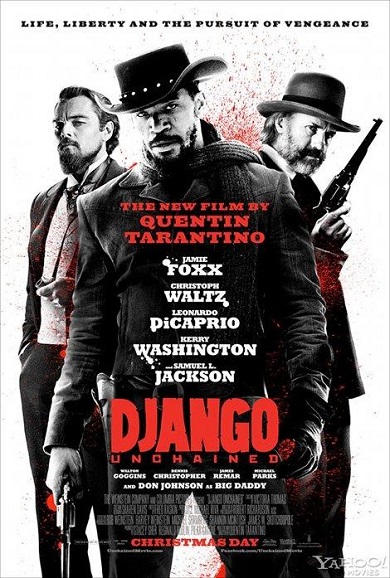
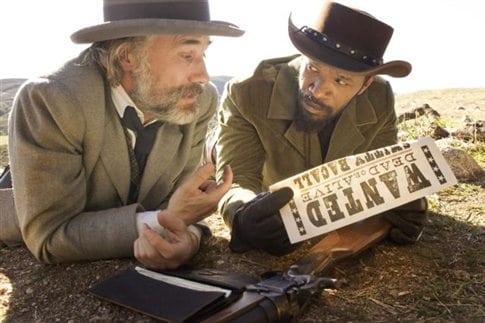
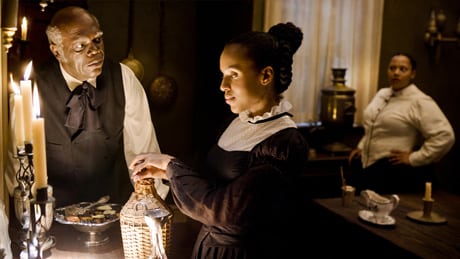



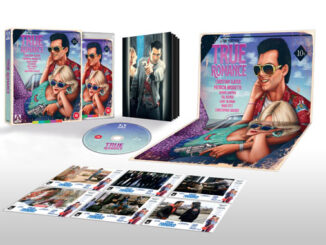

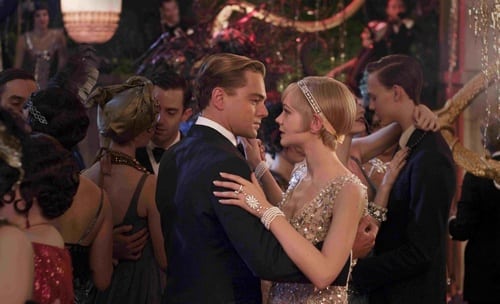
Can’t really disagree with any of of your excellent review DL. Probably would give it an 8.5 or 9 out of 10. Waltz and Jackson were fantastic. The tone really darkens in the final third. Thank you Tarantino for restoring my faith in cinema.